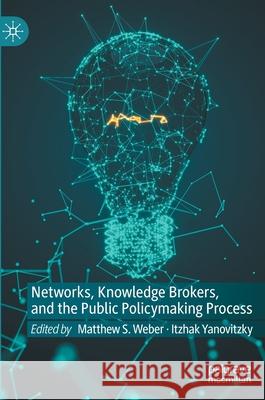Networks, Knowledge Brokers, and the Public Policymaking Process » książka



Networks, Knowledge Brokers, and the Public Policymaking Process
ISBN-13: 9783030787547 / Angielski / Twarda / 2021 / 451 str.
Networks, Knowledge Brokers, and the Public Policymaking Process
ISBN-13: 9783030787547 / Angielski / Twarda / 2021 / 451 str.
(netto: 575,06 VAT: 5%)
Najniższa cena z 30 dni: 578,30
ok. 16-18 dni roboczych.
Darmowa dostawa!
Chapter 1.Knowledge Brokers, Networks and the Policymaking Process (by Matthew S. Weber and Itzhak Yanovitzky).- Chapter 2. Disseminating Evidence to Policymakers: Accounting for Audience Heterogeneity (by Jonathan Purtle).- Chapter 3. “Being Important” or “Knowing the Important”: who is the best to influence policy? (by Kathryn Oliver).- Chapter 4. Integrating Connectionist and Structuralist Social Network Approaches to Understand Education Policy Networks: The Case of the Common Core State Standards and State-Provided Curricular Resources (by Emily M. Hodge, Susanna L. Benko and Serena J. Salloum).- Chapter 5. Measuring Issue Preferences, Idea Brokerage, and Research-Use in Policy Networks: A Case Study of the Policy Innovators in Education Network (by Joseph J. Ferrare, Sarah Galey-Horn, Lorien Jansy and Laura Carter-Stone).- Chapter 6. The Role of Brokers in Connecting Educational Leaders around Research Evidence (by Kara S. Finnigan, Alan J. Daly, Anita Caduff and Christina C. Leal).- Chapter 7. An Ego-Network Approach to Understanding Educator and School Ties to Research: From Basic Statistics to Profiles of Capacity (by Elizabeth N. Farley-Ripple and Ji-Young Yun).- Chapter 8. Mixing Network Analysis and Qualitative Approaches in Educational Practices (by Mariah Kornbluh).- Chapter 9. A Multi-Level Framework for Understanding Knowledge Sharing in Transnational Immigrant Networks (by Rosalyn Negrón, Linda Sprague-Martínez, Eduardo Siqueira and Cristina Brinkerhoff).- Chapter 10. Promoting healthy eating: A whole-of system approach leveraging social network brokers (by Kayla de la Haye, Sydney Miller and Thomas W. Valente).- Chapter 11. Brokerage-centrality conjugates for multi-level organizational field networks: Toward a blockchain implementation to enhance coordination of healthcare delivery (by Kayo Fujimoto, Camden J. Hallmark, Rebecca L. Mauldin, Jacky Kuo, Connor Smith, Natascha Del Vecchio, Lisa M. Kuhns, John A. Schneider and Peng Wang).- Chapter 12. Platformed Knowledge Brokerage in Education: Power and Possibilities ( by Jennifer A. Lawlor, J.W. Hammond, Carl Lagoze, Minh Huynh and Pamela Moss).- Chapter 13. Network approaches to misinformation evaluation and correction ( by Katherine Ognyanova).- Chapter 14. Closing the Theory-Research Gap in Knowledge Brokerage: Remaining Challenges and Emerging Opportunities ( byItzhak Yanovitzky and Matthew S. Weber).
Matthew Weber (Ph.D., University of Southern California) is Associate Professor of Communication at Rutgers University’s School of Communication & Information. Matthew is a computational social scientist and an expert on media ecosystems, organizational dynamics and the use of Big data in research. His research explores processes of organizational change and adaptation, with a focus on understanding how organizations navigate complex information ecosystems in order to develop evidence-informed policies and policymaking processes. Matthew’s work has been widely published in leading academic journals, as well as in the popular press, and is funded by grants from a number of federal agencies including the National Science Foundation.
Itzhak Yanovitzky (Ph.D., University of Pennsylvania) is Professor of Communication at Rutgers University’s School of Communication & Information. His program of research explores effective mechanisms for improving the dissemination and implementation of evidence-informed policies and practices and building the capacity of community organizations to communicate effectively about health and wellness issues. Dr. Yanovitzky is an expert in the area of behavior change, public policymaking and translational science, and is a member of the National Academies of Science, Engineering, and Medicine’s Standing Committee on Advancing Science Communication.
This is a fascinating set of accounts of social network analysis as a tool for exploring knowledge brokerage and policymaking. I shall be keeping a copy on my shelf and look forward to sharing it with my students and colleagues in years to come.
-Annette Boaz, Professor of Health and Social Care Policy, London School of Hygiene and Tropical Medicine, UK
The range of theoretical and analytic approaches examined in this book will help us better navigate evidence use in power structures, nested structures, and politically varied policy areas. A must read for those who have not yet discovered the critical role knowledge brokers and networks play in the many facets of policymaking.
-Kimberly DuMont, Vice President, AIR Equity Initiative, American Institutes for Research (AIR)
In this illuminating volume, these outstanding scholars provide us with methodological breakthroughs that shed light on types of knowledge brokering, transactions, preferences, and behaviors of network actors in think tanks, the media, research and policymaking.
-Christopher Lubienski, Professor of Education Policy, Indiana University
This book demystifies how research makes its way into public policy and shines a bright light on the knowledge brokers who make it happen. Providing keen insights into strategies for building more robust networks that connect research and policy, this is the authoritative text on how to apply network analysis to improving the use of research evidence in policy.
-Vivian Tseng, Senior Vice President, Program William T. Grant Foundation www.wtgrantfoundation.org
This book advances knowledge brokerage scholarship and methodology as applied to policymaking contexts, focusing on the ways in which knowledge and research are utilized, and go on to influence policy and practice decisions across domains, including communication, health and education.
The volume compares, assesses and delineates social network approaches to knowledge brokerage across domains and is useful for students and scholars of social network analysis and policymaking including in health, communication, public policy and education policy.
Matthew Weber is Associate Professor of Communication at Rutgers University’s School of Communication & Information, USA.
Itzhak Yanovitzky is Professor of Communication at Rutgers University’s School of Communication & Information, USA.
1997-2026 DolnySlask.com Agencja Internetowa
KrainaKsiazek.PL - Księgarnia Internetowa









